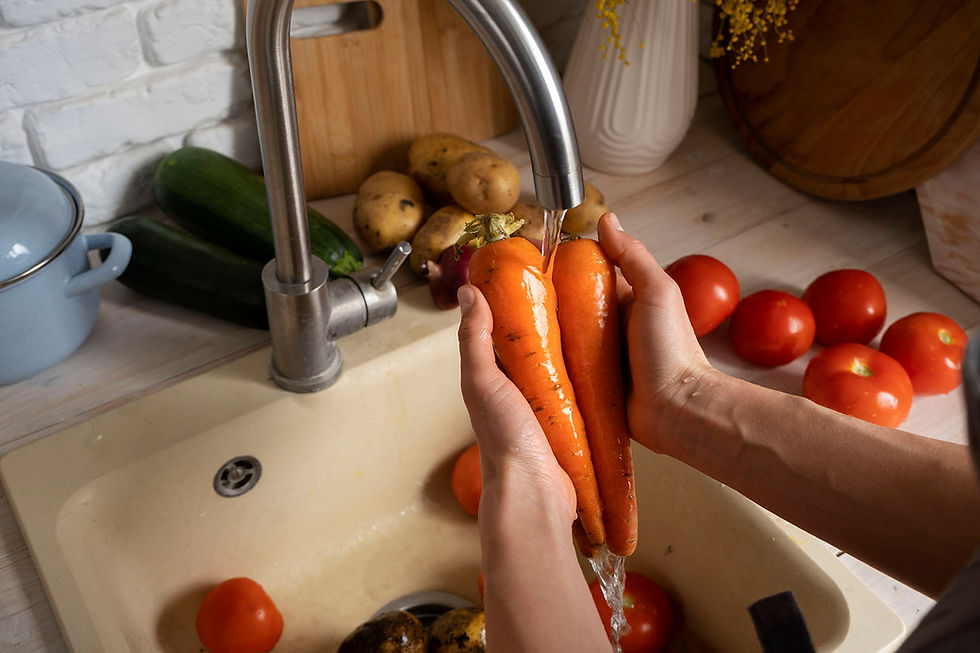Bottled Water vs. Tap Water: Which Is Safer for Your Baby?
- Eli G

- Jun 16, 2024
- 4 min read

Introduction
Choosing the right water for your baby is crucial, especially when it comes to preparing formula and ensuring safe drinking water. Parents often face the dilemma of deciding between bottled water and filtered tap water. This article delves into the pros and cons of both options, considering aspects such as safety, cost, environmental impact, and health concerns.
Presence of Contaminants in Drinking Water
Water quality can vary significantly depending on the source and treatment processes. Both bottled and tap water may contain contaminants, but the types and levels can differ. Understanding these contaminants is essential for making an informed decision for your baby’s health.
Common Contaminants in Tap Water
Lead: A serious concern, especially in older plumbing systems. Lead exposure can cause developmental delays and learning difficulties in children.
Chlorine: Used to disinfect water but can leave harmful byproducts.
Fluoride: Often added to tap water for dental health, but excessive amounts can cause dental fluorosis in young children.
Nitrates: Agricultural runoff can lead to high nitrate levels, which are particularly harmful to infants, causing methemoglobinemia or "blue baby syndrome."
Bacteria and Viruses: While generally safe, tap water can occasionally be contaminated with pathogens.
Common Contaminants in Bottled Water
Microplastics: Found in many bottled water brands, potentially leading to health risks over time.
Chemical Leaching: Chemicals from plastic bottles, such as BPA, can leach into the water, posing health risks.
Inconsistent Regulation: Bottled water is not always as strictly regulated as tap water, leading to variability in quality.
Health Concerns
The presence of these contaminants raises significant health concerns, especially for infants who are more vulnerable due to their developing systems.
Health Concerns with Tap Water
Lead Exposure: Can lead to developmental and cognitive issues.
Chlorine Byproducts: Long-term exposure may increase the risk of cancer and other health issues.
Excessive Fluoride: May cause dental and skeletal fluorosis.
Nitrate Contamination: Can interfere with oxygen transport in the blood of infants, causing serious health issues.
Pathogenic Contamination: Can lead to gastrointestinal illnesses and other infections.
Health Concerns with Bottled Water
Microplastic Ingestion: Potentially linked to various health problems, including hormonal disruption.
Chemical Exposure: Chemicals like BPA can disrupt endocrine functions and pose other health risks.
Inconsistent Quality: Variable regulation can lead to inconsistencies in safety and quality.
Which Water Treatment Will Eliminate Contaminants?
To ensure the safest water for your baby, it is crucial to use effective water treatment solutions. Here are some reliable options:
AquaCarbonGuard Catalytic Carbon Filter
The AquaCarbonGuard Catalytic Carbon Filter effectively removes chlorine, chloramine, and other organic contaminants, providing safer water for your baby.
AquaBlue Whole House Filter System
The AquaBlue Whole House Filter System offers comprehensive filtration, removing a wide range of contaminants, including lead, chlorine, and other harmful substances.
AquaGuard UV SYSTEM for Bacteria Removal
For microbiological safety, the AquaGuard UV SYSTEM for Bacteria Removal is highly effective in eliminating bacteria and viruses, ensuring your tap water is safe from pathogenic contamination.
AquaRevive Reverse Osmosis System
The AquaRevive Reverse Osmosis System is one of the most thorough methods for removing contaminants, including nitrates, heavy metals, and fluoride, providing the purest water for your baby.
Cost Considerations
Bottled Water
Initial Cost: Generally higher due to the recurring expense of purchasing bottled water.
Long-Term Cost: Over time, the cost of bottled water can add up significantly.
Filtered Tap Water
Initial Cost: Involves an upfront investment in a filtration system.
Long-Term Cost: More economical in the long run due to lower maintenance and replacement costs compared to continuously buying bottled water.
Environmental Impact
Bottled Water
Plastic Waste: Contributes significantly to plastic pollution.
Carbon Footprint: The production and transportation of bottled water result in a higher carbon footprint.
Filtered Tap Water
Reduced Plastic Waste: Using a filtration system minimizes plastic waste.
Lower Carbon Footprint: More environmentally friendly due to reduced need for transportation and packaging.
Making the Decision: Bottled Water vs. Filtered Tap Water
When deciding between bottled water and filtered tap water for your baby, consider the following factors:
Safety
Filtered tap water, when treated with the right filtration systems, can be just as safe, if not safer, than bottled water. Systems like the AquaCarbonGuard Catalytic Carbon Filter, AquaBlue Whole House Filter System, AquaGuard UV SYSTEM for Bacteria Removal, and AquaRevive Reverse Osmosis System ensure high-quality, contaminant-free water.
Cost
Filtered tap water tends to be more cost-effective over time. Investing in a reliable filtration system can save money compared to the recurring cost of bottled water.
Environmental Impact
Choosing filtered tap water significantly reduces plastic waste and the overall carbon footprint, making it a more sustainable option.
Conclusion
For the safety and well-being of your baby, carefully consider the pros and cons of bottled water versus filtered tap water. While both have their benefits, filtered tap water, when treated with appropriate systems, offers a safer, more cost-effective, and environmentally friendly solution. Ensure your water is contaminant-free and safe for your baby by investing in quality filtration systems like those provided by Aqua-Wise Water Treatment Solutions.
Call to Action
Ensure the safety of your family’s drinking water with Aqua-Wise Water Treatment Solutions. Explore our range of filtration systems and find the perfect solution for your needs. Schedule Your FREE Water Test Today: 727-236-7161 and take the first step towards cleaner, safer water for your baby and your entire family.




Comments